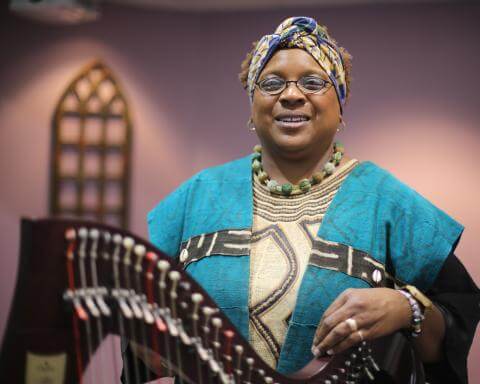WMU Domestic Violence Awareness Team Seeks to Educate, Equip, and Empower Families Facing Abuse
October 25, 2019

 RICHMOND, Va.—As a member of Woman’s Missionary Union of Virginia’s Hope Team: Domestic Violence, Jocelyn Henry-Whitehead emphasizes that “domestic violence or intimate partner violence is really a global issue.”
RICHMOND, Va.—As a member of Woman’s Missionary Union of Virginia’s Hope Team: Domestic Violence, Jocelyn Henry-Whitehead emphasizes that “domestic violence or intimate partner violence is really a global issue.”
As she seeks to help others break the cycle of domestic violence through awareness and education, she has participated in several conferences and mission trips across the U.S. as well as in Kenya, Rwanda, South Korea and Spain.
“Wherever I go, domestic violence is there in that particular place,” she said. As an advocate for domestic violence awareness based on her own experience growing up in an abusive home, she added, “I’m so thankful that I can do this.”
Citing the global impact of domestic violence, Jocelyn said, “I wear a world watch to remind of that.” She noted that according to the World Health Organization, approximately one out of three women throughout the world faces domestic or intimate partner violence. Although males also can be victims, females are disproportionately affected.
Among individuals who have gotten involved with WMUV’s domestic violence awareness initiative, “some of them have stepped forward because of their own personal experiences with domestic violence or with relatives or friends,” she said.
Noting that “this is a learning journey for us,” Jocelyn said key questions to address include: “How does the church respond? What are some strategies that churches and communities, individuals and groups can do?
“Of course, the first thing is to pray – we pray for relationships, we pray for marriages because domestic violence is across ages and stages and gender.”
Additionally, “there’s a research component that we need to find out more information in terms of where there might be shelters and the legal ramifications around that.” The next step, she said, is to determine “what are some practical things that we can actually put in action in our churches and in our organizations?”
“It’s educating, equipping, encouraging, supporting people and empowering them,” she emphasized. Brainstorming ideas during a recent conference included such options as “putting 1-800 numbers in church bulletins, putting brochures out, putting information in the bathroom, both the women’s bathroom at church, the men’s bathroom, on and on.” She said the bottom line simply is to determine “what kinds of things can we do to missionally respond to the issue of domestic violence.”
Affirming that certain aspects of domestic violence awareness can be shared with a wide range of age groups, Jocelyn said, “For every segment within the WMU umbrella, you can fit domestic violence and these issues in.
“They really fit in a way that is not offensive, that people will understand, especially when you look at adverse childhood experiences to really, ‘How do you fit that into the children’s ministry?’” she explained. “Or when you look at domestic violence, how could you fit that into the adult ministry or even into the teen or young adult ministry?”
How would such an approach impact various groups and individuals? “For some people it’s going to be deliverance, for some people it’s going to be restoration, for some people it’s going to be transformation and for some people it brings the opportunity to assist and help,” Jocelyn suggested.
For churches, missions organizations or others interested in more information about domestic violence awareness initiatives, contact Dr. Valerie Carter-Smith, WMUV executive director, at vcarter@wmuv.org or Laura Davis, WMUV director of missions involvement, at ldavis@wmuv.org.
By Trennis Henderson, WMU National Correspondent